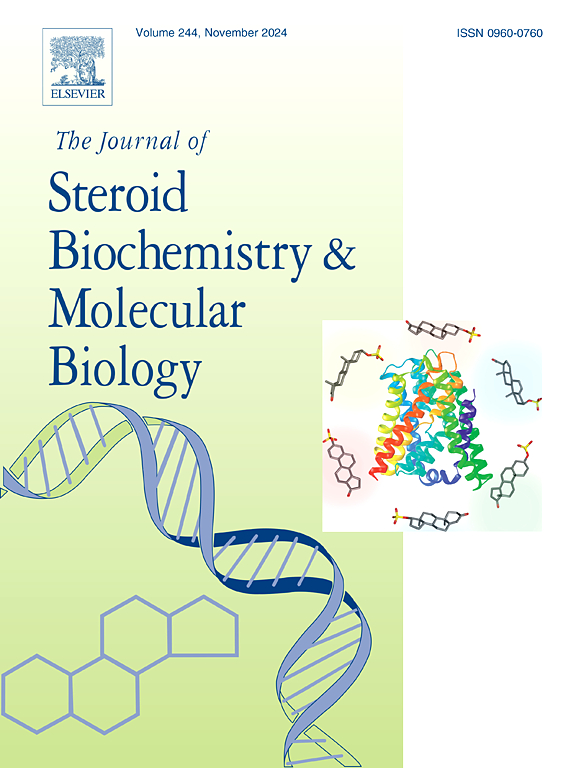(-)-Epigallocatechin-3-gallate and chlorogenic acid in combination with vitamin D as a therapeutic approach for letrozole-induced polycystic ovary syndrome (PCOS) rats: Biochemical and hormonal modulation
IF 2.5
2区 生物学
Q3 BIOCHEMISTRY & MOLECULAR BIOLOGY
Journal of Steroid Biochemistry and Molecular Biology
Pub Date : 2025-05-06
DOI:10.1016/j.jsbmb.2025.106772
引用次数: 0
Abstract
Treatment with phytochemicals have shown promising results in managing various diseases including Polycystic ovary syndrome (PCOS) which is an endocrine gynecological disorder affecting reproductive aged women. This study has demonstrated that Epigallocatechin-3-gallate (EGCG) and chlorogenic acid (CGA) in combination with vitamin D can significantly reduce PCOS like characteristics including ovarian cysts, hyperandrogenism, fasting blood glucose level, insulin resistance, hyperlipidaemia, ROS formation, oxidative stress, DNA damage, and ovarian histomorphology in letrozole induced PCOS rats. PCOS was induced in female Wistar rats by giving 1 mg/kg/day letrozole for 21 days through oral gavage. EGCG (100 mg/kg/day) and CGA (120 mg/kg/day) in combination with vitamin D (25 mcg/kg/day) was given orally for 15 days, from day 21–35. Metformin treatment was used as a positive control. Histological, microscopic analysis, and chemiluminescent immunoassays were performed to evaluate decrement in PCOS like symptoms. Nitric oxide (RNS) production, antioxidant status, and the generation of reactive oxygen species (ROS) were also assessed. Ovary homogenates and plasma samples of rats were also examined for markers of protein, lipid, and DNA oxidation. Activities of enzymatic antioxidants (superoxide dismutase, catalase, glutathione reductase, Paraoxonase-1 status) were also evaluated. EGCG + vitamin D and CGA + vitamin D has been found to restore hormonal balance by modulating steroidogenic enzymes, they also improved antioxidant enzyme activity including SOD, catalase, glutathione reductase, PON-1 arylesterase, PON-1 CMPAase, etc. Similarly, EGCG + vitamin D and CGA + vitamin D treatment have shown efficacy in normalizing the estrus cycle, reducing ovarian cysts, and improving ovarian histomorphology. They also assisted in alleviating triglycerides and cholesterol levels and maintained liver function enzymes level. However, EGCG + vitamin D proves to have better therapeutic potential modulates glucose metabolic pathways, by reducing blood glucose levels, advanced glycation end product formation, decreasing ROS generation and oxidative stress; consequently, lowers hyperandrogenism and insulin resistance. Overall, EGCG + vitamin D treatment offers a comprehensive approach in managing PCOS by targeting multiple pathways associated with this disorder, making it a potential alternative to conventional therapies.
(-)-表没食子儿茶素-3-没食子酸酯和绿原酸联合维生素D治疗来曲唑诱导的多囊卵巢综合征(PCOS)大鼠:生化和激素调节
植物化学物质治疗在治疗多种疾病方面显示出良好的效果,包括多囊卵巢综合征(PCOS),这是一种影响育龄妇女的内分泌妇科疾病。本研究表明,表没食子儿茶素-3-没食子酸酯(EGCG)和绿原酸(CGA)联合维生素D可显著降低来曲唑诱导的PCOS大鼠卵巢囊肿、高雄激素、空腹血糖水平、胰岛素抵抗、高脂血症、ROS形成、氧化应激、DNA损伤和卵巢组织形态学等PCOS样特征。雌性Wistar大鼠经灌胃给予来曲唑1 mg/kg/d诱导PCOS 21 d。EGCG(100 mg/kg/day)和CGA(120 mg/kg/day)与维生素D(25 mcg/kg/day)联合口服15 D,即第21-35天。二甲双胍治疗为阳性对照。组织学、显微分析和化学发光免疫分析评估PCOS样症状的减轻。还评估了一氧化氮(RNS)的产生、抗氧化状态和活性氧(ROS)的产生。还检测了大鼠卵巢匀浆和血浆样本的蛋白质、脂质和DNA氧化标记物。酶抗氧化剂的活性(超氧化物歧化酶、过氧化氢酶、谷胱甘肽还原酶、对氧磷酶-1状态)也进行了评估。EGCG + 维生素D和CGA + 维生素D通过调节甾体生成酶来恢复激素平衡,并提高SOD、过氧化氢酶、谷胱甘肽还原酶、PON-1芳基酯酶、PON-1 CMPAase等抗氧化酶的活性。同样,EGCG + 维生素D和CGA + 维生素D治疗在正常发情周期、减少卵巢囊肿和改善卵巢组织形态方面显示出疗效。它们还有助于降低甘油三酯和胆固醇水平,并维持肝功能酶水平。然而,EGCG + 维生素D被证明具有更好的治疗潜力,通过降低血糖水平、晚期糖基化终产物形成、减少ROS生成和氧化应激来调节葡萄糖代谢途径;因此,降低高雄激素和胰岛素抵抗。总体而言,EGCG + 维生素D治疗通过靶向与多囊卵巢综合征相关的多种途径,为多囊卵巢综合征的治疗提供了全面的方法,使其成为传统治疗的潜在替代方案。
本文章由计算机程序翻译,如有差异,请以英文原文为准。
求助全文
约1分钟内获得全文
求助全文
来源期刊
CiteScore
8.60
自引率
2.40%
发文量
113
审稿时长
46 days
期刊介绍:
The Journal of Steroid Biochemistry and Molecular Biology is devoted to new experimental and theoretical developments in areas related to steroids including vitamin D, lipids and their metabolomics. The Journal publishes a variety of contributions, including original articles, general and focused reviews, and rapid communications (brief articles of particular interest and clear novelty). Selected cutting-edge topics will be addressed in Special Issues managed by Guest Editors. Special Issues will contain both commissioned reviews and original research papers to provide comprehensive coverage of specific topics, and all submissions will undergo rigorous peer-review prior to publication.

 求助内容:
求助内容: 应助结果提醒方式:
应助结果提醒方式:


